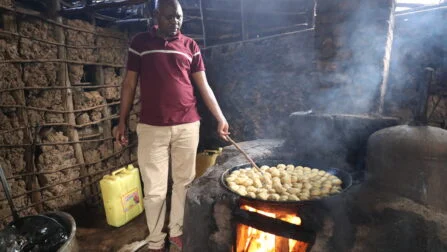
Abel Nsengamungu, a Congolese refugee in Kiziba camp, making mandazi (fried donut). ©UNHCR/Eric Didier Karinganire
“As time went on, I realized a huge demand for baked products in the camp and I decided to start my bakery,” says Abel Nsengamungu. “I am now happy that the business kept growing since then.”
Abel, 42, a Congolese refugee living in Kiziba camp, recounts how he started his bakery business starting from scratch.
“It wasn’t easy to start any venture without capital,” he says.
Having fled their home in 1996 when rebel wars broke out in the eastern Democratic Republic of Congo (DRC), Abel and his family left everything behind. In DRC, they used to grow crops and keep livestock to look after the family, but at the camp in western Rwanda, they could no longer get land to keep farming. They only had to rely on humanitarian assistance to survive.
As Abel grew up in Kiziba camp, he explains his future was uncertain without any professional skills or financial means to start a business.
Life became even harder as he started his own family in 2008. He had no means to support his wife and future children to live a decent life.
At that point, Abel decided to take a short course training in making baked goods as the demand for such products were high in the camp. But again, learning the skills was not enough to turn his business idea into an enterprise.
Luckily, in 2013 he managed to raise Rwf 17,000 (around 15 USD) to buy some wheat flour, cooking oil, and other ingredients to make his first mandazi (a fried donut) at home. From that small start, his bakery business flourished and is now worth over Rwf 4 million (about 4,000 USD) a decade later.
Despite the humble beginning, Abel had a vision for growth and explains he consistently saved a small portion of his income every month to invest in his future. As a result, Abel obtained a Frw 800,000 loan from a savings association in 2015; which allowed him to expand his business even further and acquire basic equipment such as a mixer and a traditional oven.
The new equipment quickly boosted the production capacity of the bakery. Today, Abel produces 4,200 pieces of mandazi and 1,100 loaves of bread daily.
As Abel’s bakery kept growing, his wife joined him in selling baked goods to the Kiziba camp population. Their business thrived and soon became a regular supplier to the Rwandan host community nearby, further expanding their customer base.
“I really feel excited when I see more people eating my products,” the father of five says. “The income I get from this business also enables me to provide my children with basic needs.”
Motivated by untapped opportunities in the camp, Abel and his wife also opened a food store in Kiziba, catering to the needs of fellow refugees. This not only provided additional income for their family but also contributed to the welfare of the camp’s residents.
The bakery enterprise currently employs eight workers, offering them a means to support themselves and their families.
Despite the steady progress recorded by Abel, he still faces many challenges that hamper his ambitious plan to move from low to industrial-scale production. He says, for instance, that accessing funding from financial institutions without collateral is a major hindrance.
“I wish I could get funding for acquiring electricity-powered equipment and expand the business,” Abel explains. “We still rely on firewood which is not environmentally friendly.”
Abel also says that more funding would enable him to move his activities to a more standardized factory compound.
Abel’s journey is evidence of what entrepreneurial refugees can achieve in a conducive environment. Working along with the government of Rwanda, UNHCR continues to work with partners and stakeholders to build self-reliance among refugees and their Rwandan hosts. (Source: https://www.unhcr.org/rw). (End)
